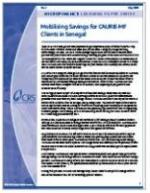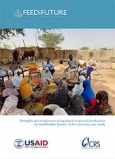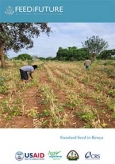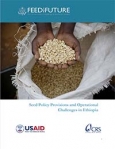Learning Briefs | October 16, 2017
Microfinance Learning Briefs
LEARNING BRIEF 1: Mobilizing Savings for CAURIE-MF Clients in Senegal (8 pages)
This learning paper documents the experience of CAURIE-MF, a CRS partner in Senegal, during the design and launch of its savings product. CAURIE-MF's clients saved diligently for many years but the institution did not have the proper license to mobilize, manage and on-lend their savings. Once legally registered and licensed as a deposit taking institution, CAURIE-MF was able to launch a new savings product which resulted in significant growth in both its portfolio and the number of clients it was able to serve. This paper shares key successes, challenges and lessons learned during the roll out of the new savings product.
LEARNING BRIEF 2: Developing Agriculture Loan Products for Poor Rural Communities
This brief examines key lessons learned by Metemamen MF, a microfinance partner of CRS in Ethiopia, during the pilot testing of a new loan product for rural poor farmers. It shares the experience of the microfinance institution as it worked with CRS' agroenterprise initiative to design financial services for farmers engaged in white pea bean production.
This learning paper looks at linking the Savings and Internal Lending Communities (SILC) methodology with orphans and vulnerable children (OVC) programming in Rwanda. CRS introduced the savings groups to help households headed by OVC to build financial assets and complement current OVC programming, with the intent to provide OVC households with reliable and safe financial services as well as an avenue for basic financial education. SPANISH VERSION
LEARNING BRIEF 4: Improving Livelihood Outcomes for People Living with HIV (11 pages)
This brief provides highlights about an integrated microfinance, agriculture and AIDSRelief project in Tanzania. It covers the project's objectives and outcomes, the growth in the number of savings groups, participation in the group by members with HIV, the introduction of a new (highly nutritious) crop in the project area, key accomplishments and lessons learned.
Horizonti is a CRS partner microfinance institution that provides financial services to the poorest and most underserved communities in Macedonia. In 2010, CRS awarded Horizonti a grant to enhance its performance through the integration of social performance management. This learning paper discusses the results.





